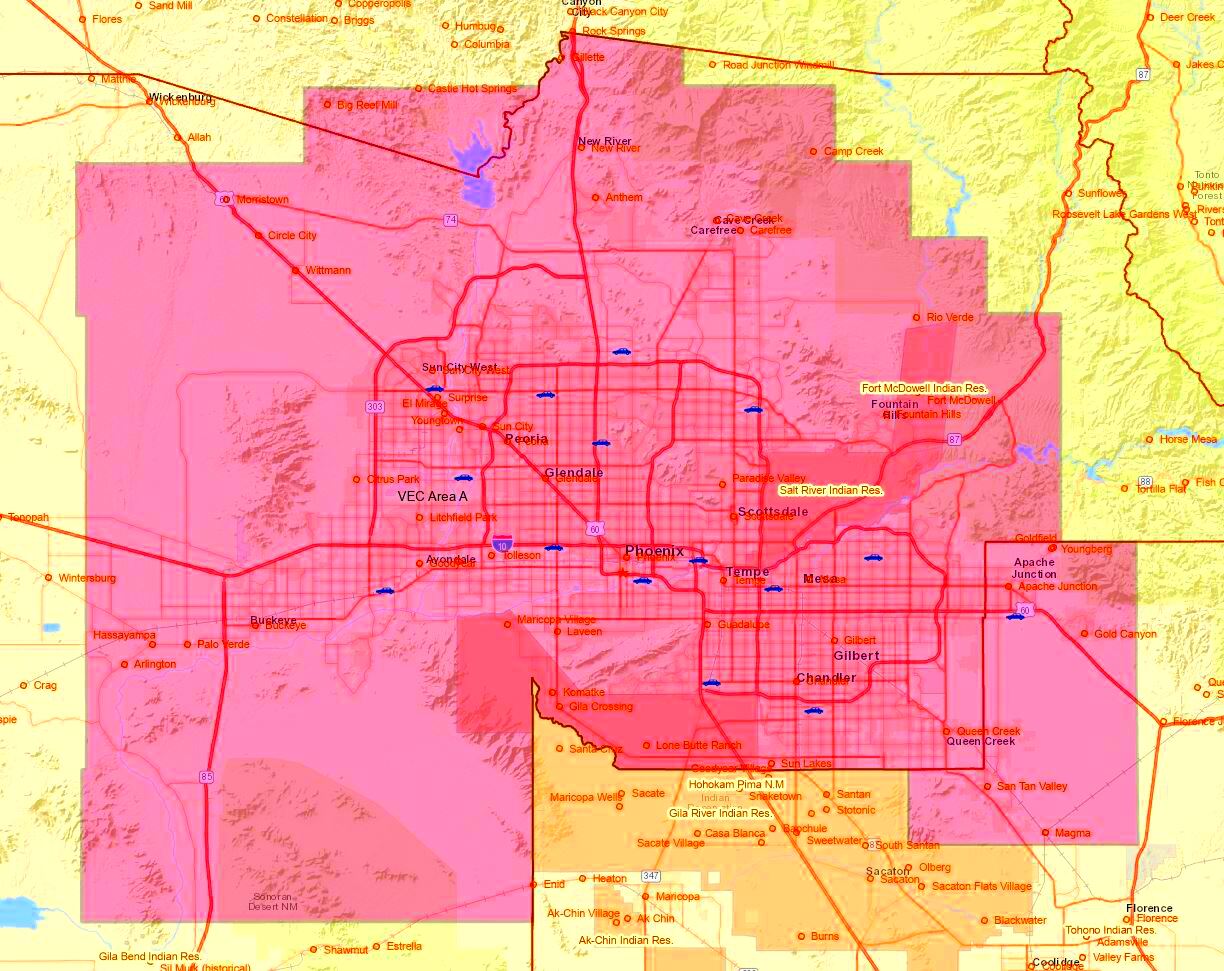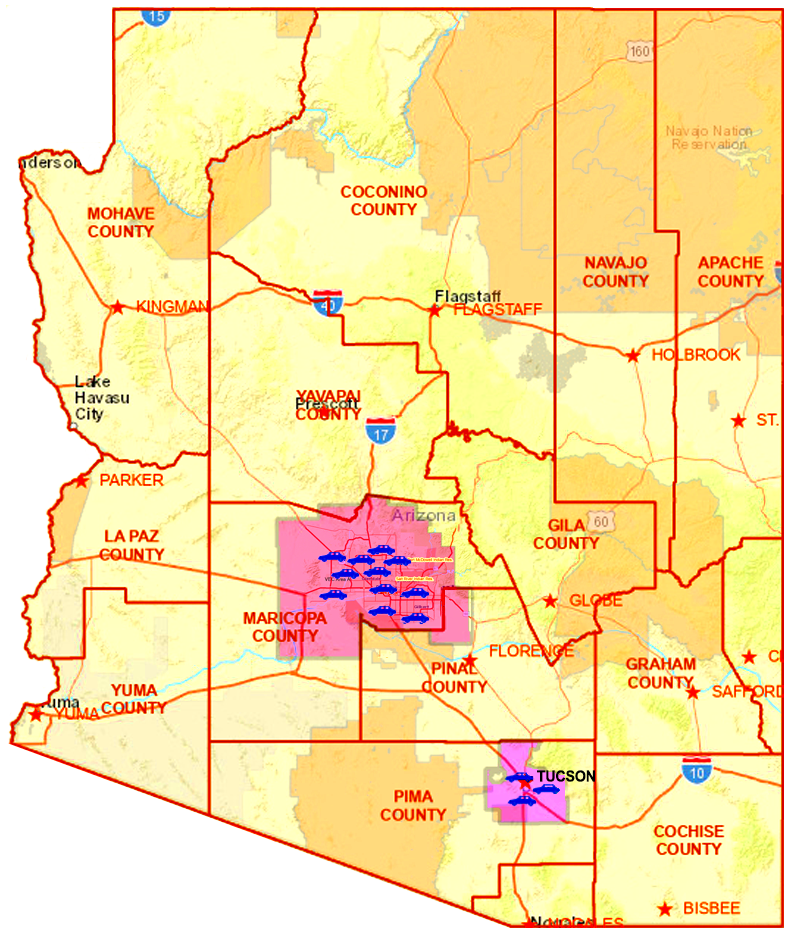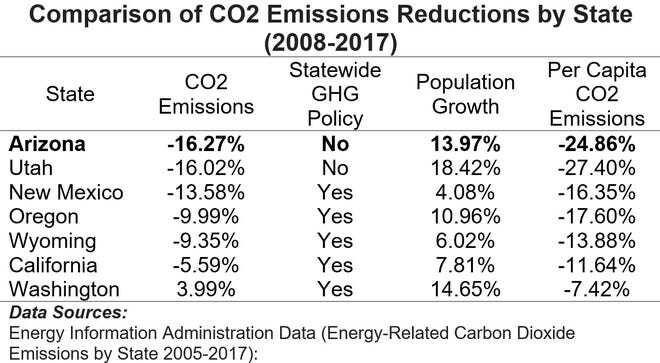Understanding Arizona’s Smog Emissions Regulation
Living in Arizona with the scorching desert sun shining down you may not pay as much attention to air quality as you should. However regulating smog emissions is essential in this region. These regulations play a role in keeping our air fresh and breathable even with the increasing number of cars on the road. If you’ve ever questioned the necessity of an emissions test for your vehicle or if you’re a newcomer to the state feeling overwhelmed by the rules this guide will provide clarity. Let’s explore how these regulations function and their significance for you.
Overview of Smog Emissions Regulations in Arizona

The smog emissions rules in Arizona aim to reduce air pollution and safeguard public well being. Let me give you a summary of the framework of these regulations.
- Purpose: The primary goal is to reduce vehicle emissions that contribute to smog and poor air quality.
- Regulatory Body: The Arizona Department of Environmental Quality (ADEQ) oversees and enforces these regulations.
- Applicable Areas: Regulations mainly apply to urban areas where air pollution is a concern, such as Phoenix and Tucson.
These rules mandate inspections to ensure cars adhere to the states emission standards. By conducting these checks we contribute to cleaner air which positively impacts our daily lives and overall well being. It’s somewhat similar to the upkeep we perform on our vehicles; it goes beyond just enhancing performance; it’s also about safeguarding our environment.
Key Requirements for Vehicle Owners

If you own a vehicle in Arizona its crucial to know a few key things to ensure you meet the smog emissions regulations.
- Emissions Testing: Most vehicles are required to undergo emissions testing every two years. This test checks for pollutants and ensures that your vehicle is running cleanly.
- Vehicle Age: Newer vehicles may be exempt from testing, but older ones, typically those over five years old, will need to pass the test.
- Test Locations: Emissions tests can be conducted at authorized testing centers. You can find these centers listed on the ADEQ website.
- Compliance: If your vehicle fails the test, you’ll need to get the necessary repairs done and retest it to comply with the regulations.
From what I’ve seen getting an emissions test can be a bit of a bother but it’s really a simple process that brings benefits to everyone. It’s one of those little things that may seem inconvenient at first but has a significant impact on preserving the air we breathe. Staying on top of these obligations helps us all contribute to safeguarding our states natural beauty.
How Smog Checks are Conducted
While getting a smog check may seem like a hassle, it plays a crucial role in maintaining the purity of our air. Lets take a look at the process behind these inspections.
- Appointment Scheduling: Most testing centers allow you to schedule an appointment online or by phone. It’s always a good idea to book ahead to avoid long wait times.
- Initial Inspection: When you arrive, a technician will inspect your vehicle to ensure it meets the necessary requirements. This includes checking the vehicle’s emissions system.
- Emissions Test: The heart of the smog check is the emissions test. Your vehicle will be connected to a machine that measures the levels of pollutants emitted from your exhaust. The machine compares these levels to state standards.
- Results: If your vehicle passes, you’ll receive a certificate that you’ll need for your registration renewal. If it fails, you’ll get a report detailing what needs fixing.
- Repair and Retest: If repairs are necessary, you’ll need to have them done at an authorized shop. After repairs, a retest will be required to ensure compliance.
Based on my personal experience getting my car smog checked was easier than I expected. It did feel like an added task to manage but witnessing the air and knowing that I’m playing a role in promoting a healthier planet made it all worth it. These inspections go beyond compliance; they serve to ensure that our air quality remains at its best.
Exemptions from Smog Emissions Testing
Not every vehicle needs to get a smog check. Here’s a quick overview of who could be off the hook.
- New Vehicles: Typically, vehicles that are less than five years old may be exempt from testing. This is because newer vehicles generally meet stricter emission standards.
- Electric and Hybrid Vehicles: Fully electric vehicles and some hybrids might not need to go through emissions testing. They don’t produce tailpipe emissions, so they’re often excluded from the testing requirements.
- Classic Cars: Vehicles that are considered classic or antique, often over 25 years old, might also be exempt, depending on their condition and modifications.
- Vehicles with Special Permits: Some vehicles that operate under specific conditions or permits might be exempt. This includes vehicles used for specific purposes like agriculture.
When I took my vintage car to an emissions center recently I was pleasantly surprised to learn that it was exempt from testing. Regulations can differ so it’s wise to familiarize yourself with the rules in your area. This seemingly minor aspect can make a difference by sparing you time and inconvenience.
Penalties for Non-Compliance
Not following smog emissions rules can lead to consequences. Here’s what you should be aware of regarding possible penalties.
- Fines: If you fail to get your vehicle tested or don’t meet the required standards, you might face fines. These can vary depending on the severity of non-compliance.
- Registration Holds: Without a valid emissions certificate, you may not be able to renew your vehicle registration. This can lead to additional complications if you need to drive your vehicle.
- Legal Consequences: In some cases, persistent non-compliance can lead to more serious legal issues, including mandatory court appearances and higher fines.
- Vehicle Impoundment: In extreme cases, authorities might impound your vehicle if it’s repeatedly found to be non-compliant and in poor condition.
Based on my experience I can say that keeping up with emissions testing is way less stressful than facing penalties. It’s all about staying on top of maintenance similar to checking your oil or tire pressure. By being diligent about your smog checks you not only prevent these hassles but also make a positive impact, on the environment. It’s truly a situation for all parties involved.
Recent Changes in Smog Emissions Laws
Staying informed about shifts in smog emission regulations can be a challenge but these updates play a role in safeguarding air quality. Arizona has recently introduced changes to strengthen environmental protection and simplify adherence to the rules. Lets explore some of the notable updates.
- Enhanced Emission Standards: New, stricter emission standards have been introduced for both gasoline and diesel vehicles. This aims to reduce the levels of pollutants released into the atmosphere.
- Increased Testing Frequency: In some areas, the frequency of required emissions testing has been increased. This change is intended to catch potential issues earlier and prevent excessive pollution.
- Introduction of Remote Testing: To make the process more convenient, remote emissions testing technologies have been introduced. This allows for more efficient monitoring without requiring a physical visit to a testing center.
- Revised Exemption Criteria: The criteria for vehicle exemptions have been updated. For example, certain newer vehicle models now fall under different testing categories, reflecting advances in automotive technology.
Based on what I’ve seen dealing with these changes can be quite challenging. I recall struggling with the rules for my car and feeling a bit overwhelmed by them. Nevertheless keeping ourselves updated and adjusting to these changes helps us all play a role in creating a cleaner environment. It’s an ongoing journey of progress and although it may appear intricate it’s crucial, for the well being of our community and our planet.
Resources for Vehicle Owners
Owning a car in Arizona carries certain duties and having access to the resources can simplify the process of dealing with smog emissions rules. Here’s a compilation of useful tools and information.
- Arizona Department of Environmental Quality (ADEQ): The ADEQ website is a treasure trove of information. It provides details on emissions regulations, testing locations, and updates on laws.
- Local Emissions Testing Centers: Many cities have dedicated testing centers. You can find a list of authorized centers on the ADEQ website or through local DMV offices.
- Automotive Repair Shops: For repairs needed after a failed emissions test, look for certified automotive repair shops that specialize in emissions systems.
- Online Forums and Communities: Online forums and local community groups can be great for advice and sharing experiences with other vehicle owners. They often provide insights and tips that are not available through official channels.
- Mobile Apps: Some mobile apps can help track your vehicle’s emissions status and remind you of upcoming test dates.
In my experience having access to these resources really helped me out. When I encountered issues with my cars emissions looking into these materials gave me a better understanding and guidance. They are essential for keeping track of your vehicles requirements and making sure you adhere to regulations.
Frequently Asked Questions
When it comes to dealing with smog emissions rules people tend to have a lot of inquiries. To address some of the concerns here are a few questions that are commonly asked along with their responses to provide clarity.
- What is the purpose of smog emissions testing? Smog emissions testing aims to measure the pollutants released by vehicles and ensure they meet state standards to help reduce air pollution.
- How often does my vehicle need to be tested? Most vehicles require testing every two years, but this can vary based on the vehicle’s age and the region in which you live.
- What should I do if my vehicle fails the emissions test? If your vehicle fails, you’ll need to have it repaired at an authorized shop and then retest it to ensure it meets the required standards.
- Are there any exemptions from emissions testing? Yes, certain vehicles, such as new cars, electric cars, and classic vehicles, might be exempt from emissions testing. Check the ADEQ guidelines for specific details.
- What are the penalties for not complying with emissions regulations? Penalties can include fines, inability to renew your vehicle registration, and, in severe cases, legal consequences or vehicle impoundment.
Looking back on my experiences I realized that receiving direct and simple responses to these inquiries proved to be immensely beneficial. It not relieved my concerns but also helped me adhere to the rules. The better equipped you are with information the more seamless the journey turns out to be.
Conclusion
Grasping the smog emissions rules in Arizona might initially appear challenging but it primarily revolves around protecting our planet and ensuring clean air. Whether its getting through smog tests or keeping up with recent updates every action we take contributes to lowering pollution and enhancing our well being. Keep in mind that although these regulations may introduce some added responsibilities to your vehicle upkeep routine they are vital, for preserving our stunning desert scenery. So embrace the journey stay informed and maintain your vehicle – it’s a minor effort that yields significant long term benefits.


